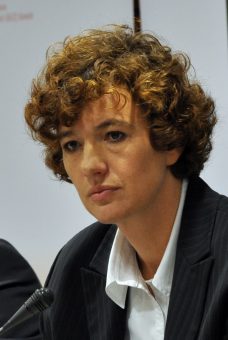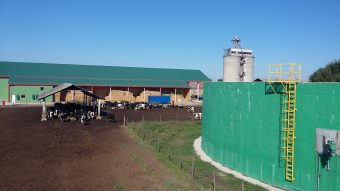
Delegation of German Economy in Serbia organized a conference entitled ‘Biomass and Biogas in Serbia’ at the beginning of April in Belgrade. A number of interested companies from Germany held a presentation in order to establish cooperation and partnership in Serbia. Many Executive Managers and owners of the companies arrived in Belgrade (‘Vecoplan’. ‘New Eco-tech Verfahtenstechnik’, ‘Strawtherm’, ‘AP Bioenergietechnik’ and many others). However, the exposition of Milica Vukadinović dragged our attention. She is “Project Development” Component leader for the programme “Development of a Sustainable Bioenergy Market in Serbia” (DKTI) of GIZ. The aim of this presentation was to present the activities and cooperation with Serbian cities and municipalities. We were acquainted with plans that should improve the standard at the local level and the quality of life on farms, in rural households, schools, hospitals, etc.
EP: Would you be so kind to tell us something about the programme “Development of a Sustainable Bioenergy Market in Serbia” (GIZ DKTI) which focuses on the prospects and challenges in developing bioenergy market in Serbia? What are the timelines of this project and what does GIZ conduct within this project?
Milica Vukadinović: The programme “Development of a Sustainable Bioenergy Market in Serbia” is a bilateral programme between the Republic of Serbia and the Federal Republic of Germany. The programme is implemented in cooperation with the Ministry of Agriculture and Environmental Protection and The Ministry of Mining and Energy of the Republic of Serbia. The programme lasts till the end of 2017.
The main objective of the programme is to strengthen the capacities and to create favourable environment for the sustainable usage of bioenergy in Serbia in different fields.
Fields of the Project are the following:
- Policy advice → improvement of framework conditions for bioenergy sector and adjustment of regulations and standards
- Biomass supply → development of local structures for heat power plant’s provision of biomass such as wood residues (production or collection, processing, transportation, storage)
- Efficient firewood utilization in households → promoting efficient utilization of wood fuels in households, as well as the introduction of standards for more efficient furnace
- Project Development → helping Serbian and German investors in developing and implementing various types of innovative projects in the field of bioenergy (for example heating system on wood biomass in public buildings, biogas power plants, power plants for the production of heat for industrial purposes)
In concrete terms, the field of Project Development, which is in the framework of GIZ DKTI project, has been focused on the development of small and medium-sized biogas power plants this year.
Germany is the leader in the field of biogas and there are over 9,000 biogas power plants with total installed power of over 4,500 MWh. Serbia has only three functional biogas power plants, which have been operating since 2013.
However, the introduction of biogas power plants on medium sized farms in Serbia would create additional constant incomes to farmers and agricultural households and more important it would reduce the negative impacts of fluctuations of other income of the farms.
Small biogas power plants on farms imply the installation of technology which uses raw materials that farmers already have and that is free. This raw material is organic waste such as animal manure from which biogas can be produced. Biogas can be used for the production of heat for the farms’ needs, but also for the production of electricity which can be sold at pre-defined incentive prices (so-called ‘feed-in’ tariffs) and in that way farmers can earn additional income.
By using electricity from renewable energy sources, Serbia is moving towards the environmental standards of the European Union; achieves increased revenue at the local level, and agricultural households gain energy independence, which can have a major role in doing business and development planning in the future. Domestic farmers have shown huge interest in new technologies which we have been promoting as an organization and we hope that we will have an opportunity to talk to Serbian farmers about the prosperity and the benefits which biogas yields has brought to them in the years ahead of us.
EP: What is your experience regarding the cooperation with local governments? Which municipalities and cities have been included in your projects in the field of bioenergy? What has been achieved so far?
 Milica Vukadinović: We would particularly want to highlight the excellent cooperation with local self-governments, engagingness of people and their readiness for changes which lead to better standard of living, sustainable development, economic development of municipalities and environmental protection.
Milica Vukadinović: We would particularly want to highlight the excellent cooperation with local self-governments, engagingness of people and their readiness for changes which lead to better standard of living, sustainable development, economic development of municipalities and environmental protection.
I will single out the cooperation with the Municipality of Pirot, which will through public-private partnership soon provide heating on wood biomass in public buildings (schools and kindergartens) in their city. Then, we conduct campaigns together we the Municipalities of Leskovac, Vlasotince, Bajina Bašta and Užice for the promotion of more efficient usage of firewood. The municipalities in the southwest Serbia in Zlatibor District (Bajina Bašta, Nova Varoš, Prijepolje, Priboj, Mali Zvornik, Novi Pazar) have made joint efforts and shown willingness to switch from heating on fossil fuels onto locally available and CO2 neutral energy source – wood chips.
EP: What is the situation regarding the use of wood biomass for energy purposes in the region? Can you compare the progress of Serbia in relation to other neighbouring countries?
Milica Vukadinović: Serbia has a huge biomass potential for electricity production in agriculture and forestry. The aim of Serbian Government is to make this potential accessible and thereby help the increase of the energy share from renewable energy sources. Heating power plants, industrial power plants and agricultural households show the increased interest for the use of bioenergy for heat and electricity. The efforts that GIZ makes in the development of bioenergy market in Serbia are of huge significance for the entire Balkan region. Our goal is not just the exchange of existing knowledge and good practices between Serbia and Germany but also between regional actors in this field. This contributes to the local economic strengthening, additional employment and significant positive impact on the environment. It is very important to point out that the sustainable usage of bioenergy requires an organised and systematic approach of actors in different sectors and at all levels.
EP: Cooperation between Germany and Serbia is long-term and includes all professions. What are the GIZ’s plans for the future period in Serbia in the field of bioenergy?
Milica Vukadinović: Cooperation between Serbia and Germany is exceptional in many areas and we are proud of our partnership because it creates real values for the citizens of Serbia. Development potentials of Serbian agriculture are extraordinary, since Serbia has significant resources. We pay much attention to this area. The German Agency for International Cooperation is very dedicated to agricultural development through the usage of bioenergy. Currently, domestic farmers rely on traditional energy sources to a great extent, which are expensive and have harmful impact on the environment. Energy independence, improvement of your business and achievement of additional revenues can be achieved with the adoption of new technological solutions and with turning towards the production of bio-energy.
Interview by: Vesna Vukajlović

